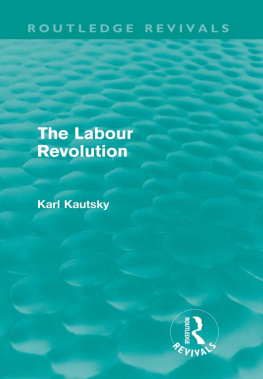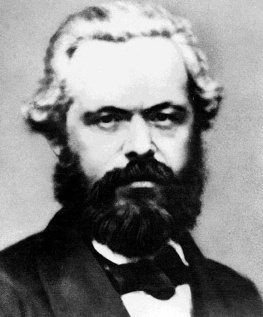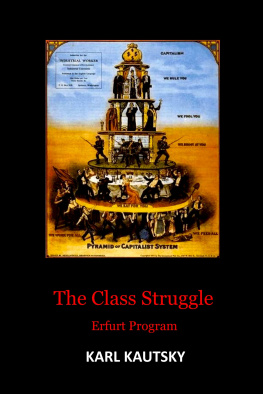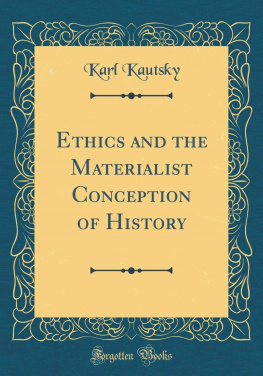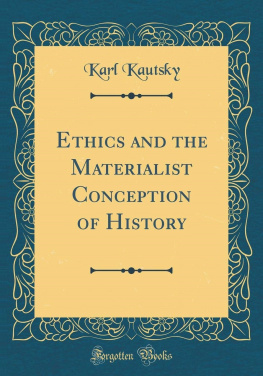Kautsky - The Historic Accomplishment of Karl Marx
Here you can read online Kautsky - The Historic Accomplishment of Karl Marx full text of the book (entire story) in english for free. Download pdf and epub, get meaning, cover and reviews about this ebook. publisher: Cosmonaut Press, genre: Politics. Description of the work, (preface) as well as reviews are available. Best literature library LitArk.com created for fans of good reading and offers a wide selection of genres:
Romance novel
Science fiction
Adventure
Detective
Science
History
Home and family
Prose
Art
Politics
Computer
Non-fiction
Religion
Business
Children
Humor
Choose a favorite category and find really read worthwhile books. Enjoy immersion in the world of imagination, feel the emotions of the characters or learn something new for yourself, make an fascinating discovery.
The Historic Accomplishment of Karl Marx: summary, description and annotation
We offer to read an annotation, description, summary or preface (depends on what the author of the book "The Historic Accomplishment of Karl Marx" wrote himself). If you haven't found the necessary information about the book — write in the comments, we will try to find it.
Kautsky: author's other books
Who wrote The Historic Accomplishment of Karl Marx? Find out the surname, the name of the author of the book and a list of all author's works by series.
The Historic Accomplishment of Karl Marx — read online for free the complete book (whole text) full work
Below is the text of the book, divided by pages. System saving the place of the last page read, allows you to conveniently read the book "The Historic Accomplishment of Karl Marx" online for free, without having to search again every time where you left off. Put a bookmark, and you can go to the page where you finished reading at any time.
Font size:
Interval:
Bookmark:
On the 14th of March, 1908, it will have been 25 years since Karl Marx died, and at the start of the same year it had been 60 years since The Communist Manifesto first appeared, in which his new doctrine found its first fulfilled expression. Those are long time spans for such a fast-paced period like ours, which changes its scientific and artistic views as quickly as its trends. Karl Marx still lives among us in full vigor, and he dominates the thought of our time more than ever, despite all crises of Marxism, despite all refutations and enlightened conquests from the podiums of bourgeois science.
This surprising and constantly growing influence would be a mystery were it not for Marxs success in bringing to light the deepest roots of capitalist society. Having done that, then naturally, so long as that social form endures, new social discoveries of any weighty significance are not to be found beyond Marx, and hence the path he indicated remains much more theoretically and practically fruitful than any other. The powerful and enduring influence of Marx on modern thought would however also be unreasonable were it not for his endeavor to run past, in spirit and mind, the confines of the capitalist process of production. His recognition of capitalisms intrinsic tendencies which point toward a higher social order prompted him to point out yet-distant goals. Through unfolding development, these goals become ever nearer and within reach of mankind, who grasps them with clarity to the same degree it becomes aware of its own greatness.
It is this unique combination of scientific depth and revolutionary daring that has led us to the fact that Karl Marx today, half a century after his death and almost three generations since his first appearance on the public stage, has greater influence today than when he was alive.
If one attempts to understand the nature of the historical achievement of this marvelous man, one can perhaps summarize it best by realizing the breadth of his work, combining biology with the humanities, merging English, French, and German philosophy, as well as the workers movement and socialism, in both theory and practice. That he succeeded without parallel in not only knowing these various fields of study, but in mastering them, made it possible for Karl Marx to accomplish the historic feat of having his character stamped on the late decades of the nineteenth century, and the twentieth century.
The foundation for all of Karl Marxs lasting success is his theoretical rigor. This we have to be most aware of. But it is this fact that presents itself as a challenge for a popular presentation [of Marxism]. We will hopefully overcome this dilemma in spite of limited intimations or clues. In any case, the points covered after this one will be easy to understand. The reader should not shy from plowing through the next few pages to get to these latter points.
The sciences are divided into two great categories: the natural sciences, which research the dynamics of living and non-living objects and the humanities, which are unjustly named such; only if the subject of study in humanities takes the form of one single individual is it given attention. The field of psychology, stemming from the humanities, operates solely with the methods of natural science without ever considering curing the spiritual illness plaguing humanity. The narrow application of natural science in this field unfortunately remains unrivaled.
What is called the humanities is in reality a social science, a science which analyzes mans relation to his fellow men. Only certain relationships are eligible, however, and only some intellectual expressions in human society come into consideration and are examined by the humanities.
Within the humanities themselves two groups can be distinguished.: The first is those which study human society as such, or man as he exists en masse. These include: political economy, the study of the laws of the social economy under the rules of commodity production; ethnology, the study of social conditions in all their tribal diversity; and, finally, prehistory, the study of social conditions from that time before written witness.
The other group of the humanities comprises sciences which up to now have primarily emanated from the individual and dealt with the position and effect of the individual in and on society: history, jurisprudence, and ethics or morality.
This second group of humanities is ancient and has always had the greatest influence on human thought. The first group, on the other hand, developed at the time of Marx's youth and had only just arrived at scientific methods. It remained restricted to specialists and had no influence on general thinking, which was influenced by the natural sciences and the humanities of the second group.
There was then a huge gap between the latter two types of sciences, which was revealed in contemporary worldviews.
Natural science had uncovered so many necessary, legitimate connections and laws in nature; that is, it had repeatedly tested the identification of cause with effect so that it thoroughly incorporated the assumption of general lawfulness in nature. It therefore completely banished from its practice the assumption of mysterious powers which mythically intervene in natural events at will. Modern man no longer seeks to make such powers favorable to himself through prayers and sacrifices, but only to recognize the lawful connections in nature in order to be able to achieve in it, through his intervention, those effects which he needs for his existence or comfort.
This is not the case in the humanities. These were still dominated by the assumption of the freedom of the human will, which was not subject to any such lawful necessity. The jurists and ethicists felt urged to hold on to this assumption, because otherwise they would lose the ground under their feet. If man is a product of circumstances, if his actions and will have the necessary effect of causes that do not depend on his own will, what should become of sin and punishment, of good and evil, of legal and moral condemnation?
The motive of that accusation was of course only a motive of "practical reason," not logical reasoning from proof. These practical reasons were provided primarily by historical science, which was essentially based on nothing other than the collection of written documents from earlier times, in which the acts of some individuals, namely the rulers, were communicated either by themselves or by others. It seemed impossible to discover any inherent necessary laws behind these individual acts. In vain did scientific thinkers try to find such laws. They were, however, reluctant to accept that the general laws of nature should not apply to man's actions.
Experience offered them enough material to show that the human mind was no exception in nature, that it always responded to certain causes with certain effects. However, as undeniable as this could be for the simpler activities which man has in common with animals, for his complicated activities, for social ideas and ideals, the natural scientists could not find the necessary causal connections. They could not fill this gap. They could claim that the human spirit was only a part of nature and within its necessary context, but they could not prove it sufficiently in all areas. Their materialistic monism remained incomplete and could not break with idealism and dualism.
Then Marx came and saw that the history, ideas, and ideals of man, and their successes and failures, are the result of class struggles. But he saw even more. Class antagonisms and class struggles had already been seen before him in history, but they had mostly appeared as the work of stupidity and malice on the one hand, of arrogance and enlightenment on the other; only Marx uncovered their necessary connection with economic conditions, the laws of which had been laid down by the laws of time. These economic conditions themselves, however, are again ultimately based on nature and the extent of man's domination of nature, which emerges from the knowledge of its laws.
Font size:
Interval:
Bookmark:
Similar books «The Historic Accomplishment of Karl Marx»
Look at similar books to The Historic Accomplishment of Karl Marx. We have selected literature similar in name and meaning in the hope of providing readers with more options to find new, interesting, not yet read works.
Discussion, reviews of the book The Historic Accomplishment of Karl Marx and just readers' own opinions. Leave your comments, write what you think about the work, its meaning or the main characters. Specify what exactly you liked and what you didn't like, and why you think so.


